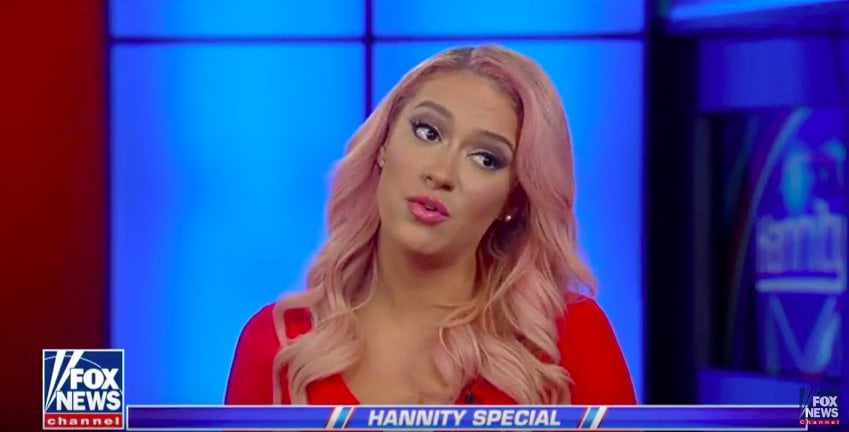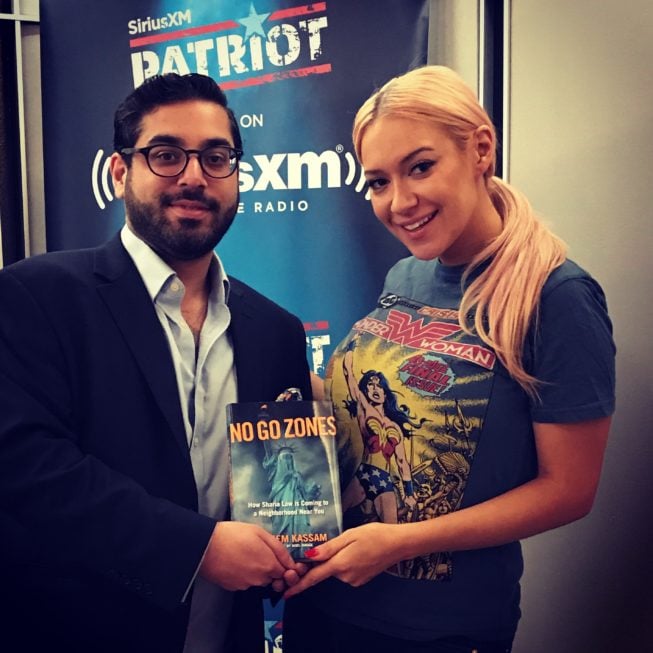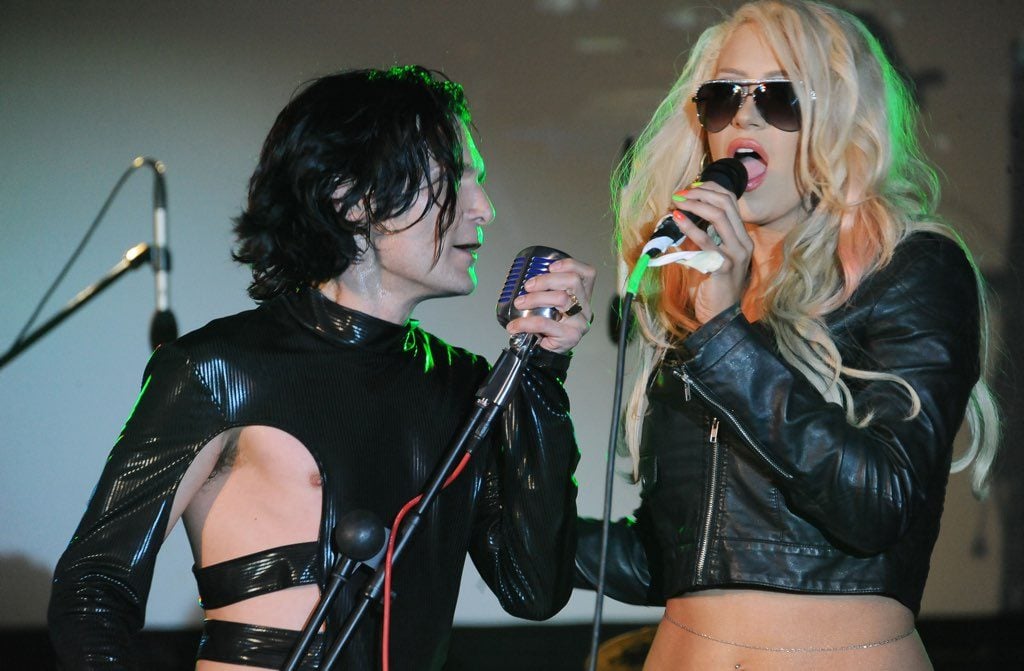



One evening early this summer, Kaya Jones was in DC wrapping up her first appearance on Sean Hannity’s Fox News show. The former member of the Pussycat Dolls had been outspoken in her support of President Donald Trump for months, but it wasn’t until her Hannity appearance that she could fully envision a future in political commentary. In the five-minute-long segment, she admonished “fake news,” said CNN was “about to be done,” and voiced the need for “unity.” The experience, she says, was breathless, empowering—a sweet shot of adrenaline.
Yet the high of being on the light-drenched set and hobnobbing in the green room had nothing on what came next. A little after 10 pm on June 28, Kaya Jones met Sebastian L. Gorka.
“I literally ran into him in the hallway of Fox,” Jones recalls. “I was so nervous. I thought he was so cool. I literally was like a geek, I didn’t even say hello. I just nodded and walked by him.”
The 33-year-old tells me she had been a fan of “Dr. Gorka and his work” for some time. “I like his tact and the fact that he is very smart, just when he’s giving a narrative, and especially when he’s defending our president, who’s being attacked every day.”
The admiration was mutual. “Genuine. Passionate about her love of our Country,” Gorka tells me of his first impressions of Jones. And he was intrigued later on when he discovered the Pussycat Dolls connection: “There is one of their songs I do like,” he reveals. “It’s called ‘Right Now.’ Old school torchsong.”
The Hannity appearance and chance meeting with Gorka, a Breitbart contributor who enjoyed a brief period of employment in the White House, marked Jones’s entree into the world of conservative media. Her segment was well received, and shortly after, Breitbart editor Matt Boyle phoned her publicist to invite her on the site’s SiriusXM show. By August, Breitbart London editor Raheem Kassam was having her pose for a photo holding his new book, which he then promoted on Twitter. That same month, I spotted her hanging out with a group of conservatives, including Boyle, as I spoke with Nigel Farage close by, in the lobby of the Trump Hotel. It seemed she was officially part of the club.
Jones’s quick ascension is a testament not just to her outspoken support of Trump, but also the premium placed by conservative media on someone with any semblance of popular appeal. Indeed, Hollywood, or the entertainment industry writ large, is a well-worn punching bag for conservatives; yet it’s also true that those few celebrity figures who vote Republican, such as Clint Eastwood, are practically deified on the right. Which makes sense: it pays to have an evangelist on the inside. But for conservative hosts and producers tasked with putting on a good show, Trump has made finding such folks tricky.
So when a young and pink-haired veteran of a defunct-but-once-famous pop band joins the cause, what do you do if you’re Fox? If you’re Breitbart, if you’re InfoWars? You lean in.
Jones, born in Toronto and raised in Las Vegas, first saw fame in 2003. At 19 years old, six years after being discovered by R. Kelly, she joined the Pussycat Dolls. The up-and-coming girl group had all the trappings of early-aughts pop stardom—flat-ironed hair extensions, vinyl bra tops, and a single whose lyrics—Don’t cha wish your girlfriend was hot like me?—were tailor-made for a bold teen’s away message. Yet after just two years with the group, Jones quit. She describes an environment in which “girls were having to sleep their way to the top,” individual members struggled with “eating disorders” and “drug disorders,” and she contemplated suicide “many a time.” (Conversely, she says Kelly, who has been accused of luring underage women into an “abusive cult,” was never inappropriate toward her.) The Pussycat Dolls, in a recent statement to Fox News, called Jones’s allegations “false.” Nonetheless, by 2005, Jones says she realized “Okay, this is not for me.”
The moment she quit, she says, is the moment she knew she was conservative. It’s unclear how the goings-on she describes within the group might be defined as “liberal,” but Jones says she has come to see “conservative” and “liberal” as synonymous with Right and Wrong, respectively. (Asked how Trump fits into that model, she tells me, for instance, she was unfazed by the infamous Access Hollywood tape: “Men are gonna be men. That doesn’t mean that they’re all rapists or bad men.”)
She channeled her newfound convictions into an appreciation of the military. In 2009, she performed on a solo tour in Iraq. “That changed me for sure…It wasn’t any longer a fluffy thing when I’d hear the anthem. I now had an actual understanding, like, ‘Oh my gosh, there are people who died for our freedoms.’” Her Republican affiliation was cemented in September 2012, when four American soldiers were killed in a terror attack at a US diplomatic compound in Benghazi. “I saw the ‘I have a concussion’ thing from Hillary Clinton,” she says, referring to the theory that Clinton feigned illness to avoid testifying on the attack, “and I’m literally watching it going, ‘This is total pivoting. They’re not actually answering what happened to our soldiers and our men.’ And that’s the first time that I really gave a shit about what I was gonna do when voting came around again.”
Meantime, in Los Angeles, Jones became the youngest female to own a record company. But she was struggling to find her footing as a solo artist. She released a handful of singles, which climbed the charts in Europe, but none broke through in the States. Calling her a D-list celebrity would have been generous.

Enter Donald Trump.
Whether they love or hate him, many politicians, journalists, and pundits owe their relevance today to Trump. So it goes with such polarizing figures: starry-eyed supporters with even a hint of media savvy become cable-news regulars overnight; same with fierce detractors. Jones is no exception. If anything, right-wing media placed a higher-than-average value on her commentary, given that she represented a link, however tenuous, between Trump and the entertainment sector, which had all but unilaterally denounced him.
“You had someone in pop culture, who young girls look up to, with an amazing singing voice, who can say, ‘This is why conservatism is a better philosophy,’” Hannity tells me over the phone. “That’s what makes her voice so important.”
Jones first garnered attention from conservative media in February, during the Grammy Awards, when friend and fellow singer Joy Villa walked the red carpet in a rhinestone-encrusted, mermaid-style “Make America Great Again” gown. “I hugged her that night…and [Villa] was like, ‘We don’t need to hide anymore, honey!’” Villa asked her if she would take a photo in her own Trump gear—a T-shirt that Jones had purchased during the election but had not yet worn. “And I said, ‘Of course,’” Jones recalls, “because it’s my truth.”
She posted her truth in the form of a selfie on Instagram, her cotton-candy-colored locks held back to show off the shirt’s MAGA slogan. (Among the many hashtags were #happyvalentinesday and #bringjoytothewhitehouse.) The photo went viral on Reddit and, accordingly, Breitbart published an article promoting it.
https://www.instagram.com/p/BQgCGN9AP14/
I ask Jones what sparked her passion for Trump. “I’ve always been a fan of his business side of the fence,” she explains. “He’s been politically funding a lot of different candidates and he’s very tough with a lot of his thoughts, but he never said he was gonna run unless he felt his narrative was needed. I loved that he started to say the things that I was thinking, but that no one had the balls to say, and he didn’t sound like a politician.”
It was a good enough answer for Hannity. He’s had her on his show several times—as recently as Monday—since that fateful June appearance. And, from our conversation, it seems he’s taken a sincere interest in furthering her career as a pundit. “She has a lot of potential. And I just like free-thinking people. Everybody on the left seems to be a bunch of sheep, not very intelligent people,” says Hannity, who does not have a favorite Pussycat Dolls song.
He told her if she was serious about transitioning from music to “the TV hits,” “you gotta bring a lot to the table.” So he says he’s been “offering her little ideas” via text, helping her sort through her positions on issues. He even set her up with her current manager, Patricia Passeretti, a Florida-based rep who, during the election, was a member of “Babes for Trump” and the dating site Trumpsingles.com. (Jones has offered singing lessons in return: “She was very adamant that she could teach me how to sing,” Hannity says. “And I said, no, you can’t; I’m tone-deaf.”)
It’s one thing to become a frequent face on Fox News, of course; the network is largely considered mainstream within the realm of conservative media. But Jones has also been actively embraced by Breitbart and other hubs of the alt-right like InfoWars. Especially as Fox primetime and Breitbart begin to splinter along pro-Trump and pro-Bannon lines, respectively, it’s worth noting that Jones is one of the few to still command attention from both. That’s in large part because she has what is, for the right, a pretty uncontroversial schtick—that “fake news” is damaging the country, and, as she put it on the Alex Jones Show on August 31, “There is nowhere in this world that is like America.” I asked Gorka how she’d managed the feat of appealing to all corners of right-wing media, and he said, “Easy: Because she’s a strong woman who’s not a hostage of the unhealthy conventional wisdoms that most ‘liberal’ women have been brainwashed by.”
All of which is to say that Jones, in her singular profile as a pro-Trump woman with a pop-star pedigree, is well-positioned to continue scaling the ranks of conservative media. Yet the very thing that got her noticed in the first place may prove her biggest obstacle to staying power; with a brand tethered so tightly to Trump, as opposed to conservatism or the Republican Party more broadly, it’s difficult to know how she’ll fare once he’s no longer there. For the moment, though, she isn’t worried. “I haven’t thought that far ahead. I’ve been asked if I wanna get involved in politics [in other ways], if I wanna run, but not right now.
“Right now,” she says, “it’s about speaking my truth.”



















